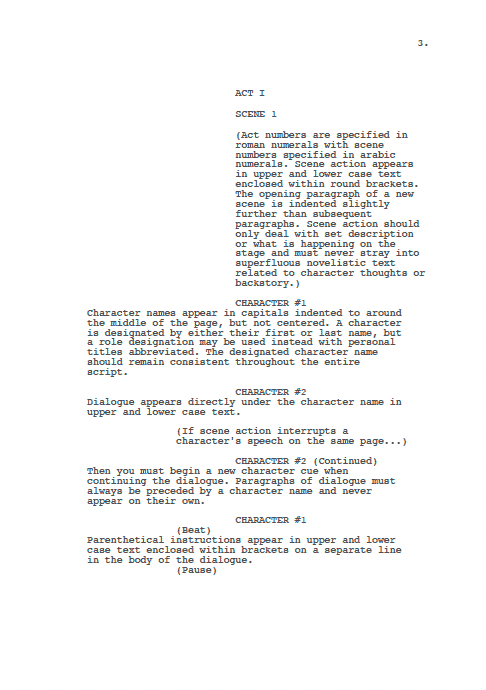What Is A Play Script? - Elements Of & Tips For Play Script Writing
Writing a play script requires research, planning, and hard work. To create an engaging and captivating story for the stage, the play writing process needs to be executed well. Read on to find out more about what this encompasses!

Writing a play script can be a daunting task, especially for new aspiring or and inexperienced playwrights. A play script is different from other forms of writing, like novel or podcast writing, as it needs to be written in a very specific format, with dialogue, stage directions, and other elements that are unique to and universally recognized by the theatre. However, with a few tips and tricks, it is possible for anyone to write a compelling and captivating play script.
Read on to find out more about the elements of a play script and the basic steps to go about play writing!

Elements of a Play Script
Whether you are writing an original play or adapting an existing work, there are certain conventions and rules that you should follow. Before you start writing your play, it is important to understand these basics of playwriting. A play script is written in a specific format, which includes the following elements:
Title page
This is where you list the title of your play, the author’s name, and the date of submission.
Scene
A scene is a section of your play, typically defined by a change of location or time. Each scene should have a heading, which includes the scene number, the scene title, and the location.
Character list
This is a list of characters who appear in the play, including their names, ages, and descriptions.
Dialogue
Dialogue is the conversation between two or more characters. Each character’s lines should be indented and separated by a blank line.
Stage directions
Stage directions are instructions for how the play should be performed. These directions should be italicized and enclosed in parentheses.
Scene transitions
Scene transitions are used to indicate a change in location or time. These transitions may be indicated by a blackout, a fade out, or a curtain call.

Who Is Involved In Writing A Play Script?
Playwriting is a collaborative process that involves several individuals who work together to bring a play to life. Here are some of the key roles involved in the process of playwriting:
Playwright
The playwright is the individual who writes the play. They are responsible for creating the characters, developing the plot, and writing the dialogue.
Director
The director is responsible for overseeing the production of the play. They work closely with the playwright to ensure that the play is being produced as intended. They also work with the actors to help them understand their roles and develop their characters.
Stage Manager
The stage manager is responsible for coordinating all aspects of the production. They work with the director to ensure that everything is running smoothly, and they are responsible for cueing the actors and managing the technical aspects of the play.
Designers
The set designer is responsible for designing the set for the play. The costume designer is responsible for designing the costumes, and the lighting designer is responsible for designing the lighting.
Production Crew
The production crew is responsible for building the set, managing the props, and running the technical aspects of the play.
Actors
The actors bring the characters to life on stage. They work with the director to understand the motivations of their characters and to develop their performances.
How To Write A Play Script
1. Do your background and genre research.
Before you begin writing your play script, it is important to do some research on the genre you are writing in. It is helpful to create an outline of your play. This can help you get a better sense of the story and ensure that all of the elements are included. Different genres have different writing conventions, so get you should be familiar with the conventions of your chosen genre as you begin writing.
For instance, if you are writing a romantic comedy, you should know the tropes and cliches that are associated with the genre, as well as the expected dialogue and plot structure. Doing this research will help you to create a strong foundation for your play.
2. Outline your plot.
Once you have done your research, you should begin by outlining the plot of your play. Start by writing down the main characters, the setting, and the main conflict. This also includes deciding how many acts and scenes the play will have, as well as the order in which they will occur. Consider what themes or ideas you want to explore in your play, and use these to create a loose outline of the plot. This will give you an idea of the structure of your play, and will help you to stay on track as you write.

3. Start considering the formatting.
When it comes to writing your play script, formatting is key. Most play scripts use a standard format, with dialogue and stage directions included. When writing dialogue, make sure that it has a natural rhythm and that the characters have their own distinct voices. This will help to draw the audience into the story, and will make the dialogue more engaging.
When writing stage directions, make sure that they are clear and concise. The stage directions should provide a visual representation of the action in the play, as well as set the mood and tone. Be sure to include any props or special effects that are necessary for the scene, as well as any sound or light cues.
If you’re looking for a place to start writing your movie script and also take care of your formatting at the same time, JotterPad’s writing platform provides you with all the tools that you would need to accompany you from the start to the end of your movie writing process.
Start writing your first draft on JotterPad’s editor with Fountain Syntax, and have formatting such as the page numbering, dialogues, action lines, and other crucial elements of writing a script formatted for you along the way. If you would prefer using a template to have a basic structure in place for you to work with already, explore JotterPad's stage play templates such as the BBC U.S Stage Play or BBC U.K Stage Play templates. These templates outline the specific and different production elements needed in a stage play for the U.S and U.K respectively for the producers and playwrights to take note of.

4. Go through a few rounds of revision.
Once you have finished writing your play script, it is important to have it read by someone else. Having a second set of eyes look over your work will help to pick up any mistakes or inconsistencies, and will give you an idea of how the play will be received by an audience. If you have the means, it is also a good idea to have a professional editor look over your work before submitting it for production.
You can also have a trusted friend or professional editor look over your work before submitting it for production. Getting feedback from other playwrights or theatre professionals can also help you improve your play. This can also give you a better sense of how the play will be received by an audience.
If you had begun your work on JotterPad, you can also easily share your work for revision using the “Export” function on the editor to export your work into a PDF file. This makes sharing your work all the more convenient and streamlined; planning, drafting, writing, and then sharing from one place.

Writing a play script can be a daunting task, but with a bit of research, planning, and hard work, anyone can create an engaging and captivating story for the stage.
Make sure to do your background research and planning beforehand, create a robust outline with the help of JotterPad's play templates, write strong dialogue that will take your audience through your plot, use the correct formatting that allows your work to be recognized industry-wide, and get feedback for your work to create a compelling play script.

